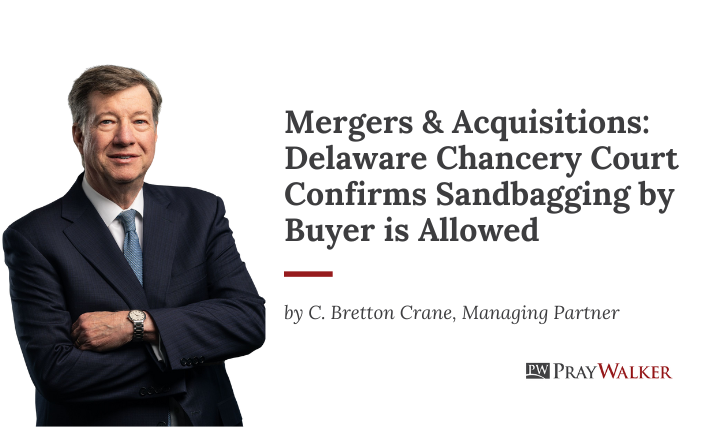
Mergers & Acquisitions: Delaware Chancery Court Confirms Sandbagging by Buyer is Allowed
by C. Bretton Crane, Managing Partner
In the context of acquisition agreements, “sandbagging” refers to a claim by a buyer based on a false representation even though the buyer knew or had reason to suspect it was inaccurate. In a recent decision, the Delaware Chancery Court has confirmed and clarified that disclosures outside of the acquisition agreement have no bearing on a buyer’s right to claim damages for a breach of the representation made by sellers in the agreement. This decision affirms Delaware as a “pro-sandbagging” state and sellers should be cautious in the sale process to clearly disclose to buyers all information responsive to the requirements of the agreement.
Takeaways to avoid post-closing claims
- Always cautiously review the representations and warranties of the agreement in detail;
- Always create a team of those in your company who have knowledge on specific points to review the representations and warranties;
- Prepare detailed disclosure of items that are responsive-when in doubt, disclose;
- Never assume the buyer knows something so it doesn’t need to be disclosed.
As discussed below, sellers can attempt to negotiate a provision that forbids sandbagging but when buyers have the upper hand, they will usually not agree to such a limitation. As a result, the importance of detailed review of the seller’s representations and warranties and preparation of detailed, fully accurate and complete disclosure schedules to the agreement is critical for sellers to avoid post-closing claims. Sellers should start the process early and involve their management team, legal, tax and accounting consultants in this process. Sellers preparing for a sale process should start the process of preparing for the buyer’s intensive due diligence process well in advance. Time pressures for deal completion make this process difficult but it remains critical to properly completing the transaction and avoiding the risks of post-closing failures.
Background
In re Dura Medic Holdings, Inc. Consolidated Litigation involved a reverse triangular merger transaction of a privately held company. After closing, the buyer alleged breaches of various representations and warranties in the merger agreement. The representations made in the merger agreement included (i) that the company had not received notice that any material customers were terminating or limiting their accounts except as set forth in the disclosure schedules (ii) that the company was not subject to any audits except as disclosed in the disclosure schedules. At trial, the buyer was able to prove that the sellers failed to disclose the imminent loss of two significant customers and failed to disclose certain audits.
Dura Medic supplied durable medical equipment (DME) to hospital groups under various contracts. Prior to the transaction, the company’s activities began to attract scrutiny from the Centers for Medicare and Medicaid Services (CMS) which administers Medicare and Medicaid. During 2017, the company began exploring a possible sale and began discussions with a private equity company resulted in signing a letter of intent in October 2017.
Ultimately in May 2018, the Company and its 39 selling stockholders entered into a merger agreement with the buyer. Under the agreement, the Company represented that it had complied in all material respects with all laws, including healthcare laws, during the three years before the sale, except as stated in a disclosure schedule (which disclosed certain of the CMS contractor audits but not all of the audits). In addition, the Company represented that no counterparty to a material contract had notified the Company that it intended to terminate or restrict its contract during the twelve months before closing. The Company identified two major customer contracts but did not identify them as having sought to terminate or restrict their agreements with the Company.
After closing, buyer learned about the ongoing audits and that the Company was the subject of additional audits that were not listed in the disclosures. In June 2019, buyer sued the sellers seeking indemnification for breaches of representations in the merger agreement.
Court’s Decision
After a five day trial, the court determined that the sellers had breached the representation that no significant customer had given notice of intent to terminate, limit or negatively alter its business relationships with the Company. A major customer had emailed the Company prior to the merger that it would be terminating its relationship with the Company within 6 months and such was not disclosed in the disclosure schedule to the merger agreement. A second customer had indicated one of its hospitals would no longer participate in the service agreement with the Company which was also not disclosed.
Regarding the breach of representations on legal compliance the buyer proved at trial that the sellers had disclosed only certain audits but had not disclosed other audits. Sellers had argued that they disclosed the specific audit during a conference call even though it was not in the disclosure schedule. Thus, the seller’s position was that the buyer was aware of the audit and could not claim that it had not been disclosed.
Vice Chancellor Laster determined that for purposes of the contractual representation in the Merger Agreement, whether the Sellers disclosed the specific audit to the Buyers outside the Merger Agreement has no bearing on the legal analysis. Vice Chancellor Laster cited prior decisions and reiterated that:
[A] breach of contract claim is not dependent on a showing of justifiable reliance. That is for a good reason. Due diligence is expensive and parties to contracts in the mergers and acquisitions arena often negotiate for contractual representations that minimize a buyer’s need to verify every minute aspect of a seller’s business. In other words, representations like the ones made in [the agreement] serve an important risk allocation function. By obtaining the representations it did, [the buyer] placed the risk that [the seller’s] financial statements were false and that [the seller] was operating in an illegal manner on [the seller]. Its need then, as a practical business matter, to independently verify those things was lessened because it had the assurance of legal recourse against [the seller] in the event the representations turned out to be false. . . . [H]aving given the representations it gave, [the seller] cannot now be heard to claim that it need not be held to them because [the buyer’s] due diligence did not uncover their falsity. . . . Having contractually promised [the buyer] that it could rely on certain representations, [the seller] is in no position to contend that [the buyer] was unreasonable in relying on [the seller’s] own binding words.
Because representations and warranties are essentially a risk allocation tool, a buyer need not prove that it justifiably relied on the representation as it would in making a claim based upon fraud.
Concluding Thoughts
Delaware law remains clear that provisions that allocate risk between parties will generally be enforced and this is equally true when it comes to interpretation of whether a representation and warranty has been breached by the seller. A seller’s argument that what a buyer knew or might have known should be deemed to have been disclosed (and thus that the buyer was “sandbagging”) is not a defense to a breach of representations and warranties claims. Certainly the parties could have agreed on a risk allocation scheme that either specifically permits or does not permit sandbagging by the buyer. Sellers might negotiate a provision that they will not be liable for an inaccurate statement if buyer had knowledge of the inaccuracy. As such provisions are contentious and buyers and sellers rarely have equal bargaining power, many acquisition agreements are silent on the concept. Delaware courts continue to be “pro-sandbagging” and if the agreement is silent on the topic, Delaware courts would not restrict a buyer from claiming a breach of representations even if it had reason to suspect its inaccuracy.
Start a conversation
We’re here to discuss. Drop us a note and a Pray Walker attorney will connect with you.



